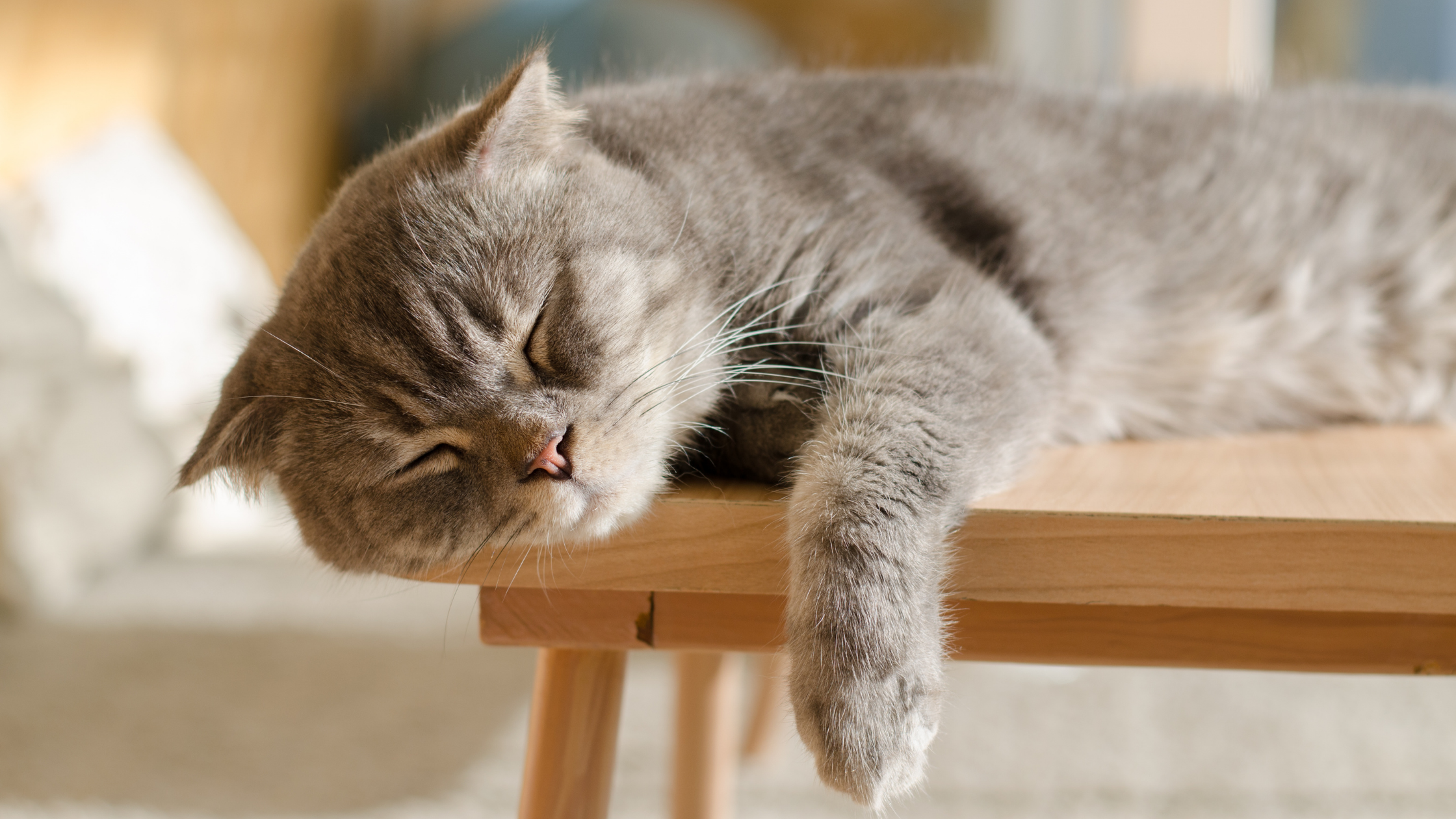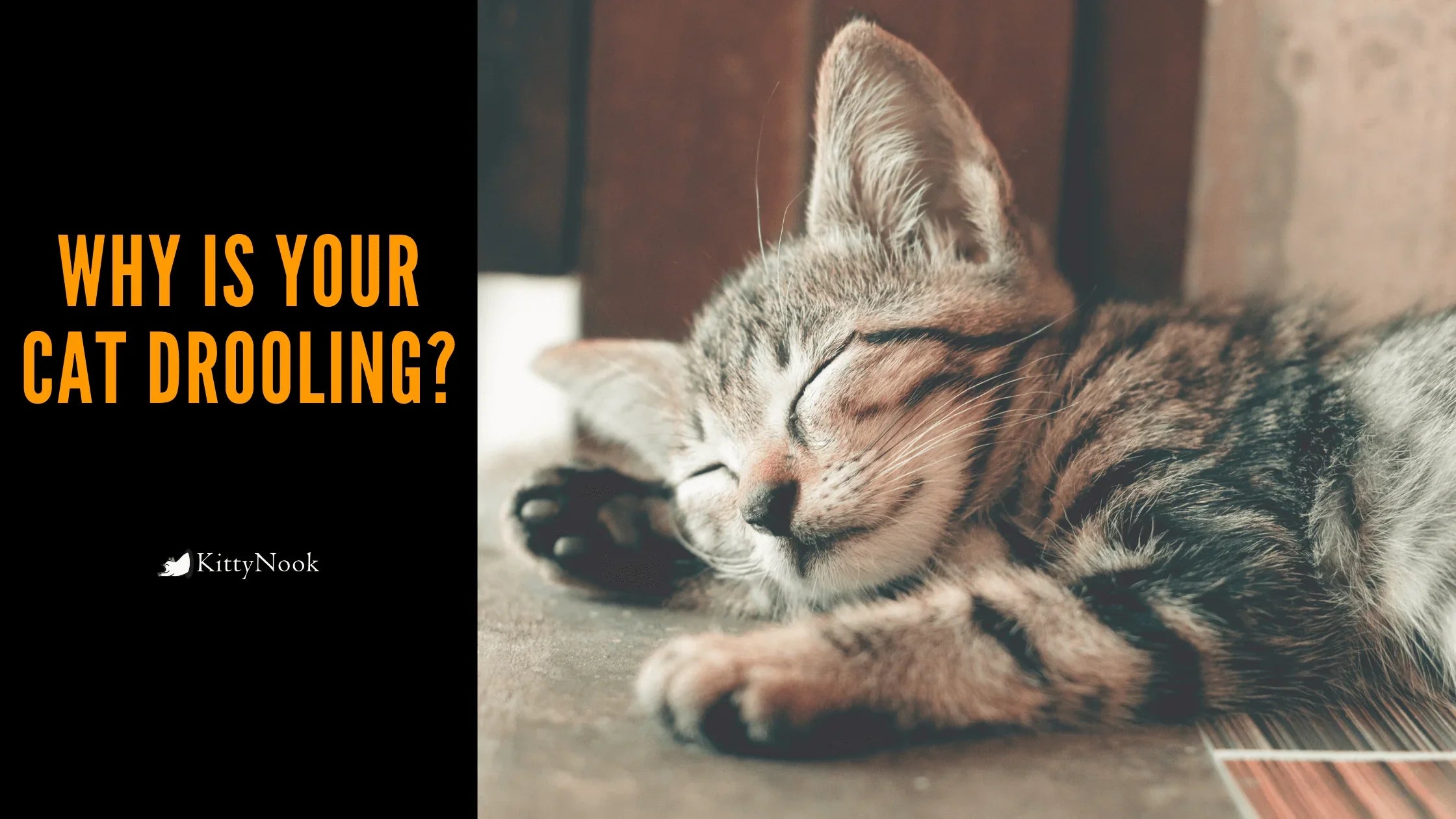There are a few reasons why cats drool. Learn why your cat is drooling and find out if you need to do something to help.
Reasons Why Cats Drool
Cats have an instinctual need to groom themselves. They use their tongues to lick or chew on areas of skin that they feel need attention. This includes licking at their paws, ears, face, tail, belly, genitals, and even other parts of their body. It's important to note that this behavior can be expected if done by healthy adult cats. However, excessive grooming can indicate illness or discomfort.
What Is Considered Normal Drooling in Cats?

It is typical behavior for some cats to drool while they are kneading or purring. Stress or anxiety may cause a cat to drool temporarily, such as during car rides, vet visits, or loud events. Cats have glands under their tongues called salivary glands. Saliva helps keep teeth clean by lubricating them when the cat is eating. It also contains enzymes that help break down proteins found in meaty foods like fish and chicken. The saliva also has antibacterial properties that protect against infections. In addition, saliva plays a vital role in digestion. For example, saliva mixes with stomach acid to form gastric juices that break down protein into amino acids that cats need.
What Is Considered Abnormal Drooling in Cats?

All cats, even if they seem healthy, should be seen by the veterinarian at least once every year for routine checkups. Cats have glands located throughout their body that produces saliva. Saliva helps keep teeth clean and moist as well as lubricate joints. It also aids the digestion of foods. When these salivary glands become overactive, it causes excessive amounts of saliva to flow from the mouth. In some cases, this excess in saliva drips onto other areas such as bedding or furniture. If left untreated, this over reproduction will eventually lead to sores around the mouth area.
Causes Of Drooling In Cats

Drooling occurs when a cat has an overactive gag reflex. The saliva produced by this reflex contains high levels of salt and water. There could be several causes of drooling in cats. Some situations will make your cat feel anxious, which makes them drool. It can sometimes be due to dry skin, making them lick themselves more than usual. Here are some possible culprits:
Oral and Dental Disease
Diseases affecting the teeth include:
• Periodontal disease such as gum disease and tooth decay
• Gingivitis and Periodontitis
• Tumors on the tongue or inside a cheek
• Oral tumors
• Osteomyelitis
• Infection from foreign bodies lodged between the teeth
• Malocclusion
• Trauma to the jawbones
• Foreign body ingestion
Nausea
Nausea in cats can have many causes, such as internal parasites, kidney disease, and gastrointestinal infections. If you notice your cat acting sickly, lazy, or having trouble eating, contact your veterinarian immediately. Your pet could be suffering from nausea caused by an infection, illness, injury, or other condition.
Vomiting
Your cat might vomit if he feels unwell due to something like food poisoning, stomach flu, or another type of sickness. Vomit usually contains undigested material from the cat's digestive tract.
Foreign Body
Strings are a prevalent oral foreign body, but other possibilities include toy parts and even grass. A foreign object that gets lodged into the throat is called an esophageal foreign body. This type of problem usually occurs when cats eat things they shouldn't have, such as bones, toys, buttons, coins, etc. It also happens if a cat develops hairballs. In this case, the hairballs are too big for their digestive system to handle, so some end up getting stuck inside the cat's airways.
Toxin Exposure
The most common toxin exposure is from eating food contaminated by rodenticides. Other sources include ingesting household cleaners, antifreeze, insect repellents, poisonous plants, and other poisous items at home. Cats are especially susceptible because they love to eat anything put out for them. They may lick their lips after smelling these items, then swallow them whole. The poison gets into the bloodstream through the lining of the stomach and intestines. Symptoms usually appear within 24 hours of ingestion.
Trauma
Cats are experts at hiding illness. A traumatic event such as being struck by a vehicle or bitten by another animal could cause bleeding inside the mouth. If this happens, it will usually bleed out through the gums. The blood will look like coffee grounds when viewed under a microscope. This condition is called a hematoma. It is essential to get immediate veterinary care if your pet suffers trauma to the head or neck area.
Heatstroke
Cats are naturally warm-blooded creatures that need to maintain their body temperature at around 98 degrees Fahrenheit. If they get too cold or overheated, however, this natural balance will go awry. The result? A potentially fatal medical emergency is called "heatstroke."
The most apparent sign of heatstroke is excessive sweating – which usually occurs when an animal gets into trouble because its internal thermostat fails to regulate its temperature properly.
Medications
Some medicines have been known to make cats vomit, which causes saliva to come out. This could be due to an allergic reaction to the drug. Some medications that affect the cat's central nervous system can also lead to excess saliva forming in the mouth.
Kidney and Liver Disease
Cats with kidney disease will usually be lethargic and uninterested in food. They may also vomit and drool frequently. The role of the cat's kidneys is to filter blood and remove waste products from the body. If they become diseased, these wastes cannot be adequately removed, which causes them to accumulate in the bloodstream. This results in a buildup of fluid around the lungs and other organs such as the heart and brain. In severe cases, this leads to death.
What To Do If My Cat Drools Abnormally?

Here are some precautionary steps that you can do when you observe that your cat is suffering from excessive drooling.
0–30 mins in: Examine the Drool
There are a vast number of factors to consider before you rush your cat to the emergency veterinarian. Some cats salivate greater than others, so if you know your cat to be a little a slobberer, it may be best to watch and wait. Additionally, you can pinpoint a particular ecological variable that might be triggering the drool (heat, the tasty smell of salmon in the air, and so on). It's likely fine to stay in the observation path as long as your feline's showing no other concerning signs and symptoms. Regardless, make some observations. How much drool is originating from your feline's mouth? Is it sudsy? Is your cat showing other symptoms, such as weakness or vomiting? The visibility of other signs or any type of indications of distress from your feline means you need to get her to the closest emergency veterinarian as quickly as feasible. Hypersalivation—a decidedly too much drool—and/or lathering drool are signs of deadly conditions such as Ptyalism, a neurological disorder, and call for an immediate specialist intervention.
30 minutes–1 hour in: Check-In With Your Vet
If your cat is shy about having its face examined, there's a good chance something's going on inside its mouth. If you think there's any chance your cat may have consumed something toxic, get her to the emergency veterinary clinic. If your cat has been drooling for several days or weeks at a time, it might need some help from the vet. Drooling that lasts this long could be caused by severe health issue like diabetes, liver failure, heart disease, thyroid issues, or even brain tumors. It's vital to rule out these diseases before assuming your cat just needs some extra TLC.
As soon as you make sure your cat's drooling isn't an emergency, you can try and determine what's causing it. Try your best to examine your feline so you can give as much information to your vet when you arrive. Here are a few of the essential things to take into consideration:
- Dental conditions typically create salivating. An infection of the mouth, a sore tooth, and severe gingivitis can all cause drooling in cats, difficulty to eat, as well as discomfort. If your cat is reluctant about having its face taken a look at, there's a likelihood something's going on inside the mouth.
- Unintentional poisoning is a typical cause of drooling in cats. If you believe there's any chance your feline might have taken in something hazardous, get her to the emergency vet center immediately.
- Severe problems such as oral cancer and chronic health conditions such as kidney disease can also cause drooling. If the drooling is reoccurring more frequently than it used to, it's time to call the veterinarian.
1 hour–2 hours in: Talk With Your Vet
Because drooling is uncommon for cats, it's always best to put in a phone call to your veterinarian for advice. Your cat's medical history will give your veterinarian a great deal of insight right into whether the salivating is a one-off or something to take even more seriously.
Probabilities are if the drooling does not seem a sign of an emergency problem, your vet will simply inform you to keep a close eye on your pet cat over the coming days and also weeks. If the drooling occurs once more or if any kind of other symptoms on top of the drooling appears, you'll undoubtedly want to schedule a visit.
If you are sure that it isn't an emergency, but your cat has been drooling excessively, you can also do these things at home to help reduce this behavior:
• Keep food away from your cat when they aren't eating. This will prevent your cat from accidentally ingesting something harmful.
• Make sure your cat gets plenty of exercises every day. Exercise helps keep their mind sharp as well as their body strong.




















